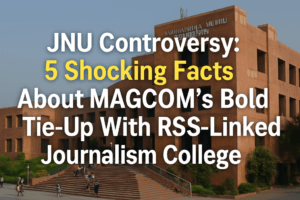JNU Controversy: 5 Shocking Facts About MAGCOM’s Bold Tie-Up With RSS-Linked Journalism College
A Kerala-based journalism institute tied to the RSS, the Mahatma Gandhi College of Mass Communication (MAGCOM), has stirred debate by claiming affiliation with Jawaharlal Nehru University (JNU). Operating from the RSS-linked Kesari publication’s headquarters, MAGCOM positions itself as India’s “first JNU-affiliated journalism college” and plans to host JNU’s vice-chancellor at its convocation. However, JNU officials clarify the relationship is limited to an academic MoU for PG diploma programs, denying formal recognition.
MAGCOM’s leadership, including RSS-affiliated mentor N.R. Madhu, openly advocates “nationalist journalism” to counter perceived “anti-national” media narratives, raising concerns about ideological influence in media education. While JNU’s website lists MAGCOM as a “recognised research institution,” the university emphasizes the collaboration involves only faculty exchanges, not accreditation. Critics argue such partnerships risk politicizing journalism pedagogy, blending education with partisan agendas.
The controversy highlights tensions over press freedom, institutional neutrality, and the role of ideology in shaping India’s media landscape.

JNU Controversy: 5 Shocking Facts About MAGCOM’s Bold Tie-Up With RSS-Linked Journalism College
A journalism institute in Kerala, operating from the headquarters of an RSS-affiliated publication, has ignited controversy by claiming formal ties to Jawaharlal Nehru University (JNU). The Mahatma Gandhi College of Mass Communication (MAGCOM), based in Kozhikode’s Kesari Bhavan—home to the RSS-linked Malayalam daily Kesari—asserts it is “India’s first JNU-affiliated journalism college.” The institution’s upcoming convocation, set to feature JNU Vice-Chancellor Santishree Dhulipudi Pandit as chief guest, has drawn scrutiny amid conflicting claims about its academic legitimacy and ideological mission.
Key Details and Conflicting Claims
While MAGCOM states its postgraduate diploma programs received JNU affiliation in 2024, JNU officials have downplayed the relationship, calling it a limited “academic collaboration” under a memorandum of understanding (MoU). The university’s website lists MAGCOM as a “recognised research institution,” but officials clarify this grants no formal accreditation. Instead, the MoU allows for faculty exchanges and shared expertise.
N.R. Madhu, Kesari’s editor-in-chief and MAGCOM’s mentor, openly frames the college’s purpose as countering “anti-national elements in media” by fostering “nationalist journalism.” This rhetoric aligns with longstanding RSS critiques of mainstream Indian media as ideologically biased.
Implications for Media Education
MAGCOM’s emergence raises questions about the role of political ideology in media pedagogy. Critics argue that conflating journalism education with “nationalism” risks prioritizing propaganda over press freedom and critical inquiry. Proponents, however, see it as correcting perceived imbalances in liberal-dominated media ecosystems.
The college currently offers PG diplomas in journalism and technical writing, with plans to expand into full-fledged postgraduate degrees. Its location within Kesari Bhavan—a hub for RSS-aligned cultural and media activities—underscores its ideological leanings.
Broader Context: Media and Ideology in India
This development mirrors a growing trend of ideologically driven institutions entering India’s education sector. Similar initiatives, such as the RSS-affiliated Shiksha Sanskriti Utthan Nyas, advocate for curriculum reforms emphasizing “Indian values.” MAGCOM’s model, however, is unique in directly linking journalism training to a political worldview.
JNU’s association with MAGCOM also contrasts sharply with its historical reputation as a bastion of left-leaning academia. While the university emphasizes that the MoU is non-exclusive, critics argue such partnerships risk eroding institutional neutrality.
The Road Ahead
As debates over media bias and “nationalist” narratives intensify, MAGCOM’s trajectory will test how educational institutions navigate ideological mandates. With India’s media landscape already polarized, the college’s success—or failure—in balancing journalistic integrity with its stated mission could set a precedent for similar ventures.
For now, the controversy underscores a pressing question: Should journalism education remain ideologically agnostic, or is there space for explicitly partisan models in a democracy? The answer may reshape India’s fourth estate for years to come.
Why This Matters
Media literacy and unbiased reporting are pillars of democratic discourse. Institutions shaping future journalists carry a responsibility to uphold these principles. MAGCOM’s overt ideological stance challenges this norm, prompting reflection on how education intersects with political influence. As readers, staying informed about such developments is crucial to understanding the evolving narratives that shape public opinion.
You must be logged in to post a comment.